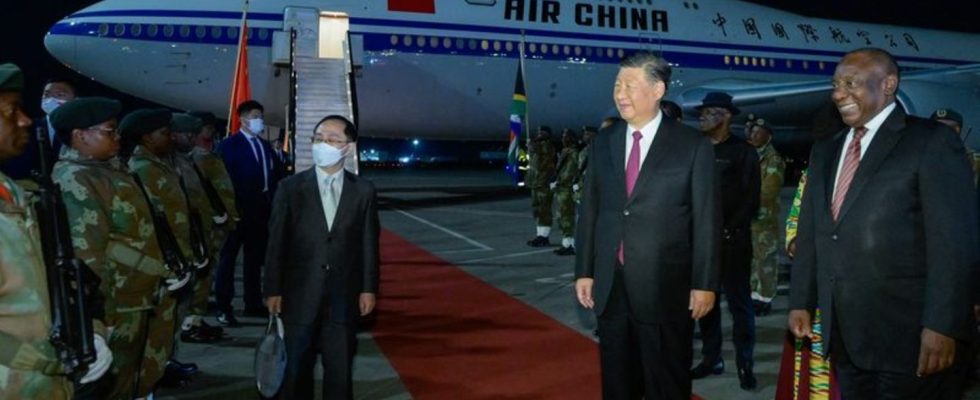summit
Planned expansion of the Brics group: who wants what?
China’s President Xi Jinping is greeted by South Africa’s President Cyril Ramaphosa upon his arrival at OR Tambo International Airport in Johannesburg. photo
© Li Xueren/XinHua/dpa
They want to have more weight internationally and therefore expand their alliance: Brazil, Russia, India, China and South Africa. In some cases, however, the five states are pursuing their own interests.
However, each country has its own agenda. At the summit meeting, which starts today in Johannesburg, South Africa, the focus will be on the discussion on enlargement. What the five member states are hoping for:
Russia
For Russian President Vladimir Putin, who is internationally isolated because of the war of aggression against Ukraine, Brics is the ideal setting to demonstrate that his country still has allies. According to this logic, “Brics plus” would also mean: the more, the better.
Above all, Russia is likely to insist that Belarus, which has been invited to the Brics summit for the first time, is accepted as a member. Thousands of Russian soldiers are stationed in Belarus, and ruler Alexander Lukashenko had also made the country available as a staging area for attacks on Ukraine.
In addition, Putin wants to persuade other states to abandon the dollar. The Kremlin chief has long criticized the US currency as an instrument of the political power struggle, which he blames on Washington. Above all, however, the significant depreciation of the Russian currency and Western financial sanctions are likely to be the reasons why he advocates that the states do their business in the national currencies. According to him, the development bank NDB (New Development Bank) founded by the Brics countries should also help.
China
China is seen as the driving force behind an expansion of the Brics Group. According to a commentary in the Chinese state newspaper Global Times, Beijing is hoping for a “fairer world economic order”. According to the Chinese state broadcaster CGTN, the Brics countries are “bringing positive energy into the global economy”.
The Shanghai-based FIS has already expanded: Most recently, Uruguay, Egypt, the United Arab Emirates and Bangladesh were allowed to join. According to experts, China wants to use “Brics plus” as a stage for political activism against the US and put China at the center of the world order.
India
India’s vision for the Brics Group revolves around promoting cooperation between developing and emerging countries. Unlike China and Russia, the country does not want to position itself against the US, with which it has good relations.
“Brics plus” also takes a rather critical view of India. The country fears it could lose influence in the group with the possible inclusion of several pro-China nations. The background to this is the tense relationship between India and China, both of which are vying for influence in their region. In addition, India will work to ensure that Pakistan stays away from the group. Due to numerous conflicts, the two hostile neighbors have already fought several wars with each other.
South Africa
Similar to India, diplomacy is in the foreground for South Africa. Brics is neither anti-Western nor pro-Russian, Foreign Minister Naledi Pandor said before the summit. Rather, South Africa is concerned with increased “South-South cooperation”, since Western industrial powers are increasingly neglecting the concerns of the Global South.
South Africa is hoping for increased economic cooperation and less dependence on a global economy for which the US dollar is the reserve currency. South Africa has invited dozens of African leaders to this week’s summit in hopes of adding many new members from the continent to give greater international weight to Africa’s concerns.
Brazil
Brazilian President Luiz Inácio Lula da Silva is also campaigning for the admission of other countries. According to media reports, he supports the entry of states such as Argentina, Saudi Arabia and the United Arab Emirates. “Brics plus” should therefore form a counterweight to the G7 group.
The G7 is a “club” that shouldn’t exist because its way of talking about geopolitics is outdated, Lula said. In addition, Lula repeatedly criticizes international structures and institutions such as the International Monetary Fund (IMF), which would often help “sink countries”. Brazil’s neighbor Argentina owes the IMF around 44 billion US dollars.

